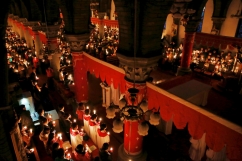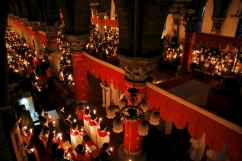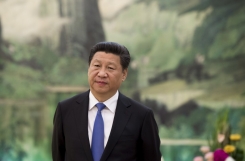Islam has the largest number of young believers in China, new research has found, despite the growth of Christianity in the country and an atheist government.
The China Religion Survey 2015, released by the National Survey Research Centre at Renmin University of China, found that 22.4 per cent of Muslims in China are under 30, with Catholicism following closely behind at 22 per cent aged 30 or under.
Professor of Buddhist studies at Renmin University, Wei Dedong, told the Global Times that "Islam tends to have a younger demographic".
"Most believers of Islam belong to ethnic minority groups and it is common for a woman to give birth to several children," he said. "The children would also become Muslims while it is very rare to have an adult converting to Islam."
The survey, which involved interviews from over 4,000 religious sites between 2013 and 2015, also found that Buddhism and Taoism are more popular with the older generations, and Buddhism has the largest following over all. Protestantism, however, has the most places of worship.
China has long been considered one of the worst countries for religious liberty. Designated a country of particular concern by the US since 1999, the latest report from the Commission on International Religious Freedom (USCIRF) found an "alarming increase in systematic, egregious, and ongoing abuses" in 2014.
Last year "the Chinese government took steps to consolidate further its authoritarian monopoly of over all aspects of its citizens lives," the report states. "People of faith continue to face arrests, fines, denials of justice, lengthy prison sentences, and in some cases, the closing or bulldozing of places of worship."
Though freedom of religion is guaranteed under the Chinese Constitution, it is restricted to those who belong to state-sanctioned "patriotic religious associations" within Buddhism, Taoism, Islam, Catholicism and Protestantism – the only recognised religions. The government closely regulates and monitors religious activities among these groups, and undercover officials are known to sit in on meetings. Surveillance cameras even adorn the walls of many sanctioned churches.
According to the China Religion Survey, some 60 per cent of those who work at places of worship said they think government regulations are fair. However, the research follows news that the government-led demolition campaign against churches has spread from its base in Wenzhou, Zhejiang province, to other dioceses.
At least 400 churches are believed to have been torn down or had their crosses forcibly removed in the last year, the majority of which were in Wenzhou – known as the 'Jerusalem of the East' because of its large Christian population. According to UCA news, five Catholic churches in Taizhou and Hangzhou dioceses had their crosses removed and demolished on July 2.
A local source told the website that authorities said they were under orders to "Sinicize" the churches.
"When we asked the officials what means by 'Sinicize' the churches, they said they did not know either but they have to remove the crosses anyway," the source said. "It is obviously an action directed against Christianity".
Chinese President Xi Jinping first mentioned the "Sinicization" of religion in May. "Active efforts should be made to incorporate religions into socialist society," he said.
Top Communist Party official Zhang Chunxian then urged religious leaders to "immerse [their faith] in the Chinese culture...in order that religions can develop in a normal and healthy way".
Speaking in Urumqi in June, Zhang said "hostile forces" had infiltrated religious groups.

















